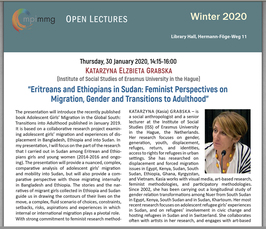"Eritreans and Ethiopians in Sudan: Feminist Perspectives on Migration, Gender and Transitions to Adulthood"
Open Lectures Winter 2020
- Date: Jan 30, 2020
- Time: 02:15 PM - 04:00 PM (Local Time Germany)
- Speaker: Katarzyna Elzbieta Grabska (Institute of Social Studies of Erasmus University in the Hague)
- KATARZYNA (Kasia) GRABSKA – is a social anthropologist and a senior lecturer at the Institute of Social Studies (ISS) of Erasmus University in the Hague, the Netherlands. Her research focuses on gender, generation, youth, displacement, refuges, return, and identities, access to rights for refugees in urban settings. She has researched on displacement and forced migration issues in Egypt, Kenya, Sudan, South Sudan, Ethiopia, Ghana, Kyrgyzstan, and Vietnam. Kasia works with visual media, art-based research, feminist methodologies, and participatory methodologies. Since 2002, she has been carrying out a longitudinal study of gender relation transformations among Nuer from South Sudan in Egypt, Kenya, South Sudan and in Sudan, Khartoum. Her most recent research focuses on adolescent refugee girls’ experiences in Sudan, and on refugees’ involvement in civic change and hosting refugees in Sudan and in Switzerland. She collaborates often with artists in her research, and engages with art-based research to understand issues of belonging, displacement, mobilities and identities. She also is a film-maker. In 2016, in collaboration with a team of researchers and filmmakers, she produced a film based on her collaborative research project Time to look at girls: migrants in Ethiopia and Bangladesh. The long version of the film, 2 Girls, has been shown at over 30 film festivals and awarded 10 first prizes. She is also the writer, producer and co-director of the film Barbara Harrell-Bond: a life not ordinary (2018). She has published extensively on issues of gender relations and displacement. Kasia is the author of Gender, Identity and Home: Nuer repatriation to South Sudan (2014) which received the Armory Talbot Prize in 2015, co-editor of Forced Migration: Why Rights Matter? (2008), and a co-writer of Adolescent Girls’ Migration in the Global South: Transitions into Adulthood (2019).
- Location: MPI-MMG, Hermann-Föge-Weg 11, Göttingen
- Room: Library Hall

For more details please contact buethe(at)mmg.mpg.de.
The presentation will introduce the recently published book Adolescent Girls’ Migration in the Global South: Transitions into Adulthood published in January 2019. It is based on a collaborative research project examining adolescent girls’ migration and experiences of displacement in Bangladesh, Ethiopia and into Sudan. In my presentation, I will focus on the part of the research that I carried out in Sudan among Eritrean and Ethiopians girls and young women (2014-2016 and ongoing). The presentation will provide a nuanced, complex, comparative analysis of adolescent girls’ migration and mobility into Sudan, but will also provide a comparative perspective with those migrating internally in Bangladesh and Ethiopia. The stories and the narratives of migrant girls collected in Ethiopia and Sudan guide us in drawing the contours of their lives on the move, a complex, fluid scenario of choices, constraints, setbacks, risks, aspirations and experiences in which internal or international migration plays a pivotal role.
With strong commitment to feminist research methodologies and based on collaborative research methods, the presentation will also address the methodological and ethical issues of researching among adolescent refugees and migrants. The main argument is that migration of adolescent girls intersects with other important transitions in their lives, such as those related to education, work, marriage and childbearing, and that this affects their transition into adulthood in various ways. While migration is sometimes negative, it can also offer girls new and better opportunities with positive implications for their future lives. The presentation explores also how concepts of adolescence and adulthood for girls are being transformed in the context of migration.